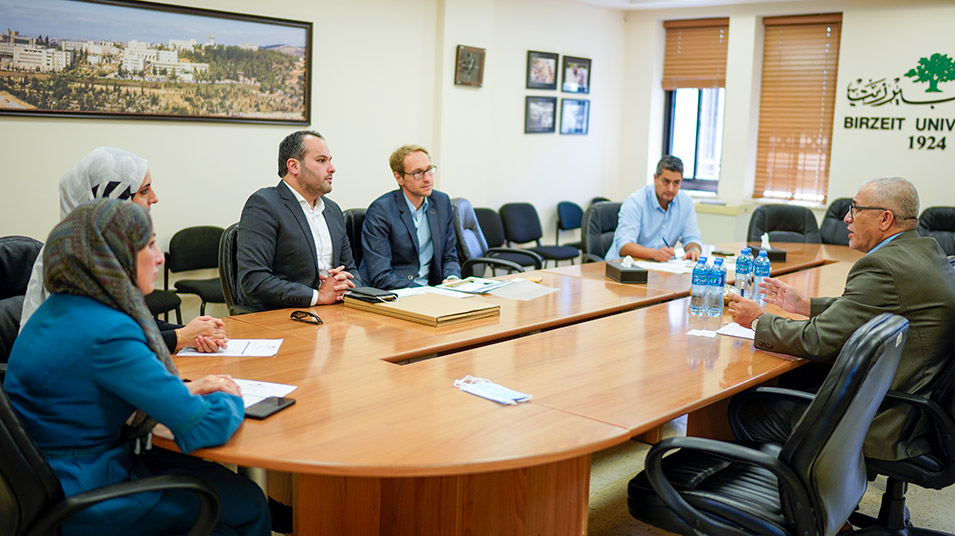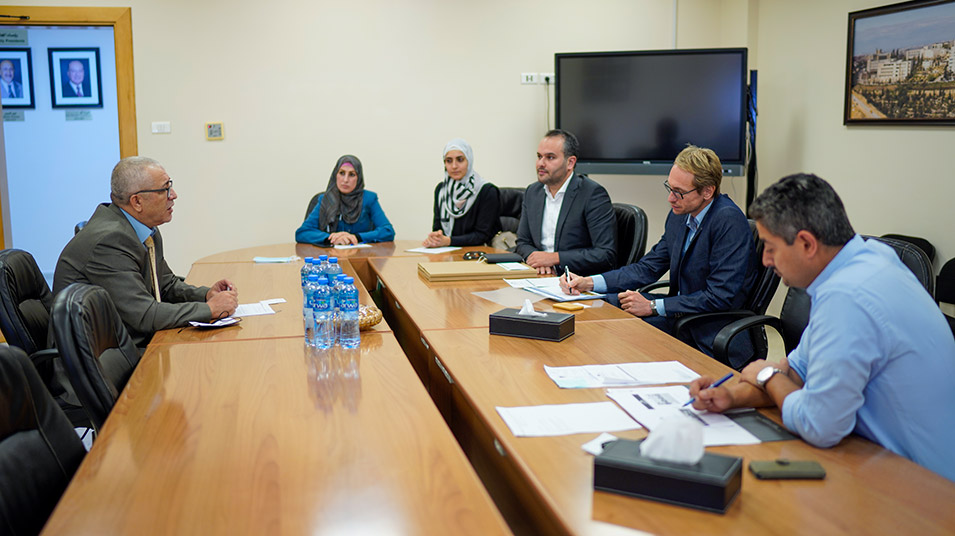GIZ, accreditation commission representatives explore joint cooperation and advanced programs in visit to Birzeit
Dr. Steffen Entenmann, head of the More Job Opportunities for Palestinian Youth (MJO) program at GIZ, and Wissam Deeb, the communications advisor at the GIZ’s Palestinian offices, discussed joint cooperation and dual study programs in a meeting with Birzeit University’s administrators and faculty members on Tuesday, August 24, 2021.
Comprising Sahar Alhwitat, the acting director of the national exams center at the Accreditation and Quality Assurance Commission, and Duha Bani Odeh, the acting director of accreditation, the team met with Dr. Talal Shahwan, the vice president for academic affairs, and Dr. Amir Khalil, the external academic relations director.
Shahwan presented a brief overview of Birzeit University, discussing its growth from a small school for girls established in 1924 to the premier Palestinian higher education institution. The university, he noted, offers more than 114 academic programs leading to bachelor’s, master’s, and Ph.D. degrees through its nine faculties.
Through its world-class academic programs and community-focused initiatives spearheaded by its 11 institutes and centers, Shahwan explained, Birzeit University equips young Palestinians with the skills and knowledge necessary to develop their communities and affect positive change regionally and internationally.
With the proposed dual-study programs, Shahwan said, the university will have even more tools at its disposal to empower students to excel at their professional careers, locally and internationally, and help strengthen and develop the local economy.
Khalil highlighted Birzeit University’s diverse connections with local, regional, and international higher education institutions and research centers, noting that the university is an active member of several affiliations and exchange programs. Such connections, he said, present students, faculty, and staff members with the opportunity to gain new knowledge and perspectives that help them develop both the university and their communities.
Stressing the importance of establishing linkages with the various constituents of the Palestinian community, Khalil added that Birzeit University continuously updates its programs and offerings with the cooperation of local public, private, and civil-society organizations. Additionally, the university collaborates with these institutions on new programs and initiatives that benefit both students and the broader Palestinian community.
The Leadership and Active Citizenship Program – Masari, noted Amir, is one example of such collaborative initiatives. The program, which incentivizes students to plan their lives and engage in their surroundings from the first day they step foot on the university’s campus, is carried out with the cooperation of local Palestinian civil-society institutions.
After the meeting, the GIZ/ACAC team met with Dr. Allan Tubaileh, dean of the Faculty of Engineering and Technology, and Dr. Mohammad Al Karaeen, an assistant professor of mechanical and mechatronics engineering, to discuss the college’s programs and interdisciplinary approaches as well as the skills it provides to engineering majors to prepare them for a professional career in Palestine and beyond.
Tubaileh and Al Karaeen led the team on a tour of the Faculty of Engineering and Technology’s facilities and labs, such as the virtual reality theatre and the thermodynamics, power, measurements, fluid mechanics, and internal combustion laboratories.
The team also met with Dr. Samia Al-Botmeh, dean of the Faculty of Business and Economics, and discussed the college’s facilities and programs as well as the training opportunities that are offered to senior business and economics students.
While the faculty does offer advanced training courses in partnership with various Palestinian businesses, Al-Botmeh said, a dual-study program will offer students more comprehensive training that, combined with specialized modules and courses, can give them the skills and expertise needed to push their careers forward and advance Palestinian industry as a whole.








